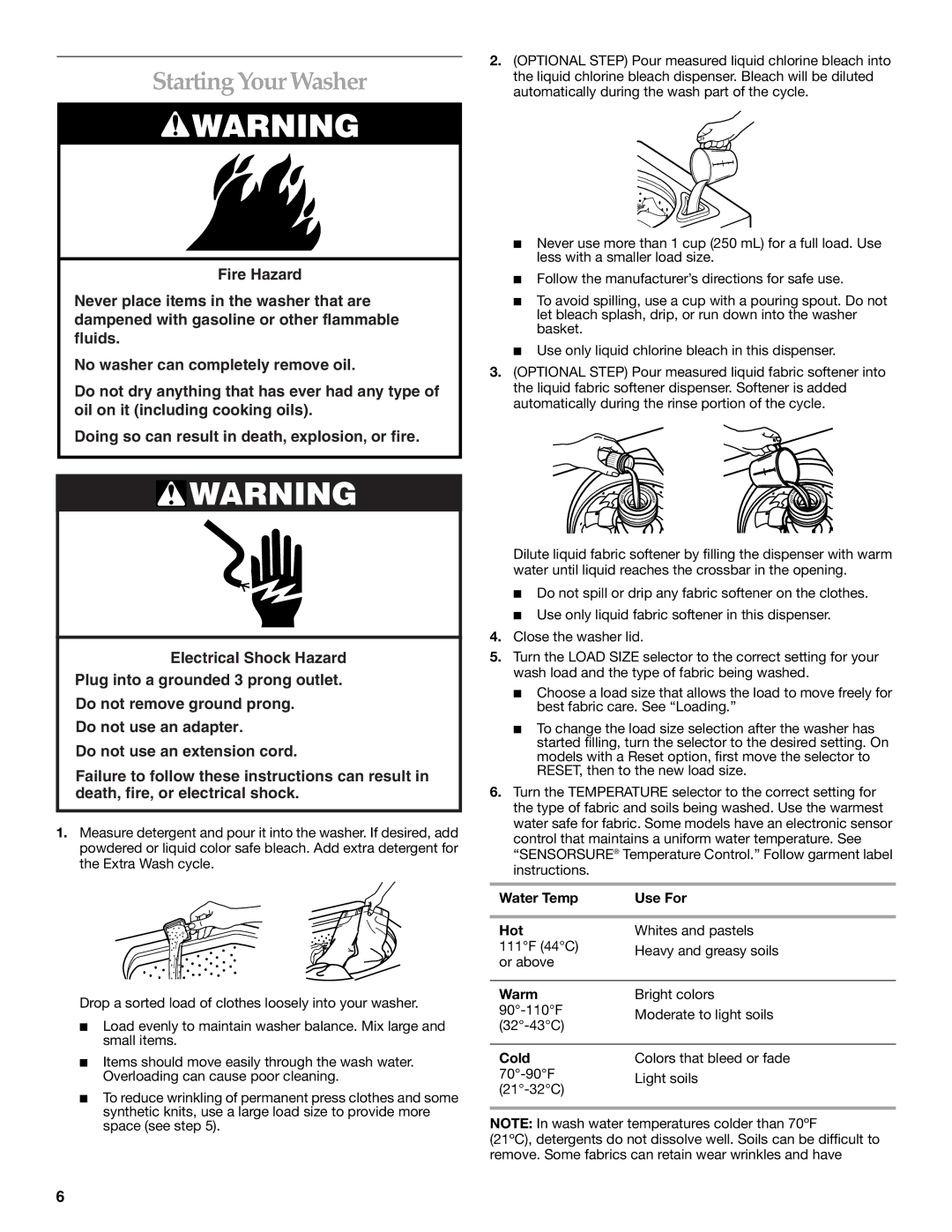
Starting Your Washer
Fire Hazard
Never place items in the washer that are dampened with gasoline or other flammable fluids.
No washer can completely remove oil.
Do not dry anything that has ever had any type of oil on it (including cooking oils).
Doing so can result in death, explosion, or fire.
2.(OPTIONAL STEP) Pour measured liquid chlorine bleach into the liquid chlorine bleach dispenser. Bleach will be diluted automatically during the wash part of the cycle.
■Never use more than 1 cup (250 mL) for a full load. Use less with a smaller load size.
■Follow the manufacturer’s directions for safe use.
■To avoid spilling, use a cup with a pouring spout. Do not let bleach splash, drip, or run down into the washer basket.
■Use only liquid chlorine bleach in this dispenser.
3.(OPTIONAL STEP) Pour measured liquid fabric softener into the liquid fabric softener dispenser. Softener is added automatically during the rinse portion of the cycle.
![]() WARNING
WARNING
Electrical Shock Hazard
Plug into a grounded 3 prong outlet.
Do not remove ground prong.
Do not use an adapter.
Do not use an extension cord.
Failure to follow these instructions can result in death, fire, or electrical shock.
1.Measure detergent and pour it into the washer. If desired, add powdered or liquid color safe bleach. Add extra detergent for the Extra Wash cycle.
Drop a sorted load of clothes loosely into your washer.
■Load evenly to maintain washer balance. Mix large and small items.
■Items should move easily through the wash water. Overloading can cause poor cleaning.
■To reduce wrinkling of permanent press clothes and some synthetic knits, use a large load size to provide more space (see step 5).
Dilute liquid fabric softener by filling the dispenser with warm water until liquid reaches the crossbar in the opening.
■Do not spill or drip any fabric softener on the clothes.
■Use only liquid fabric softener in this dispenser.
4.Close the washer lid.
5.Turn the LOAD SIZE selector to the correct setting for your wash load and the type of fabric being washed.
■Choose a load size that allows the load to move freely for best fabric care. See “Loading.”
■To change the load size selection after the washer has started filling, turn the selector to the desired setting. On models with a Reset option, first move the selector to RESET, then to the new load size.
6.Turn the TEMPERATURE selector to the correct setting for the type of fabric and soils being washed. Use the warmest water safe for fabric. Some models have an electronic sensor control that maintains a uniform water temperature. See “SENSORSURE® Temperature Control.” Follow garment label instructions.
Water Temp | Use For | |
|
| |
Hot | Whites and pastels | |
111°F (44°C) | Heavy and greasy soils | |
or above | ||
| ||
|
| |
Warm | Bright colors | |
Moderate to light soils | ||
| ||
|
| |
Cold | Colors that bleed or fade | |
Light soils | ||
|
NOTE: In wash water temperatures colder than 70ºF
(21ºC), detergents do not dissolve well. Soils can be difficult to remove. Some fabrics can retain wear wrinkles and have
6
